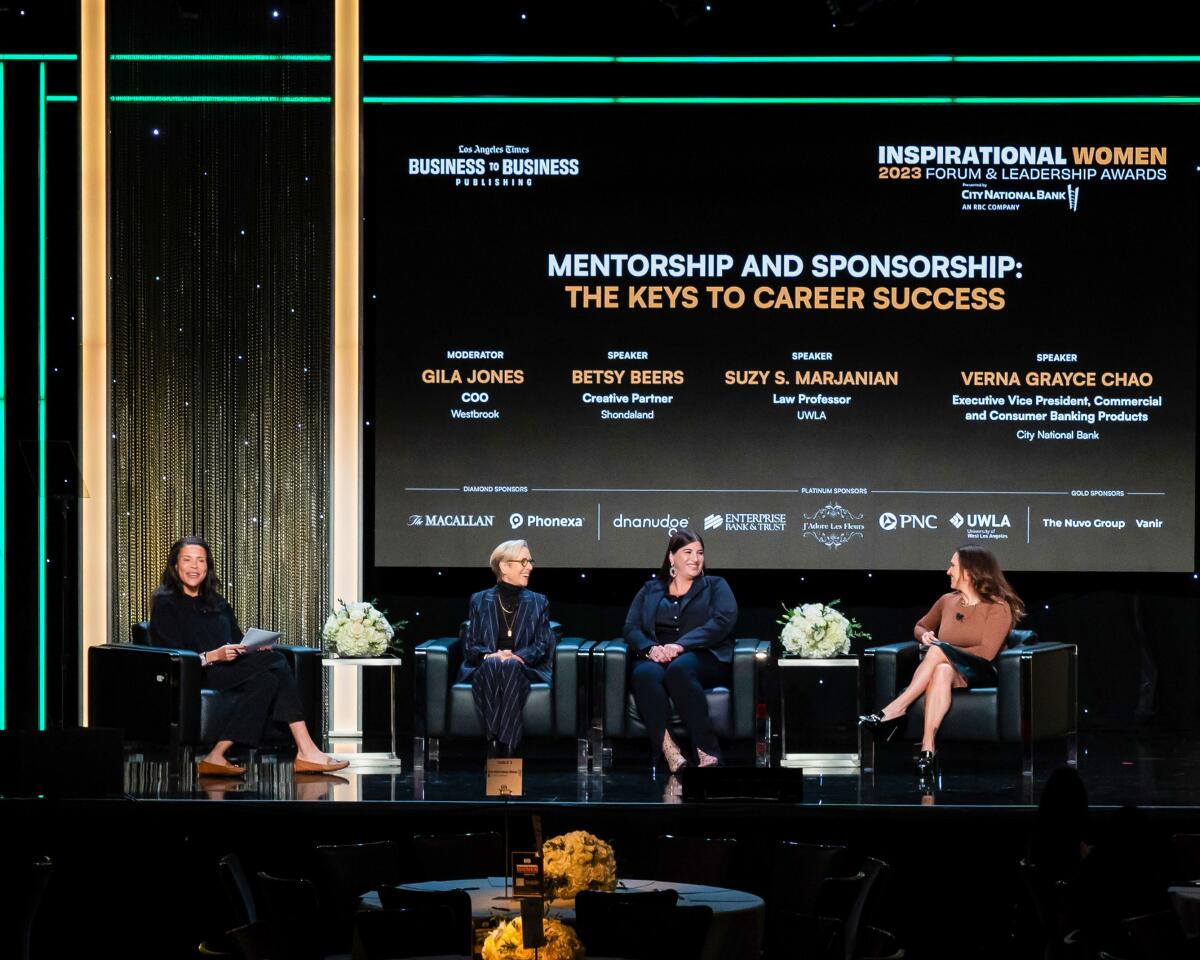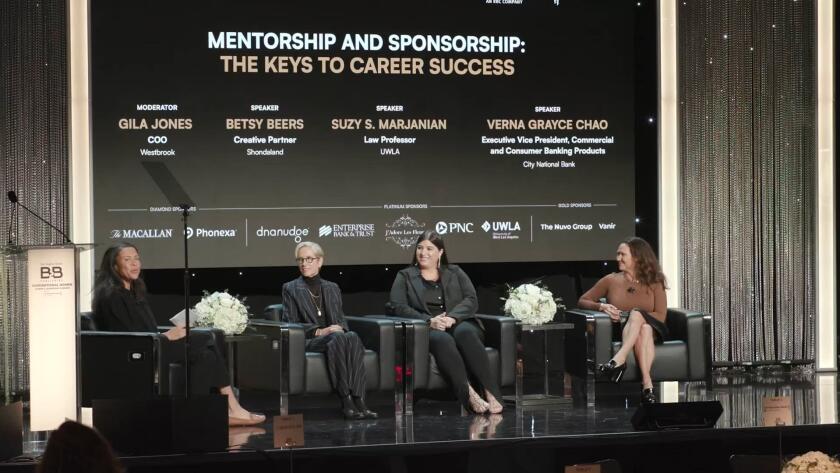Mentorship and Sponsorship – The Keys to Career Success

- Share via
Mentorship is an imperative part of the journey for many soon-to-be business leaders. This mentor-sponsor relationship has been hugely important for businesswomen, as they navigate a world that is difficult, brand new, and, at times, hostile to their goals. The women in this panel shared insights on what it takes to be a mentor, how to get the most out of sponsorship and how participating in either role is mutually beneficial.
Moderator: Gila Jones
COO – Westbrook
Gila Jones is the COO of Westbrook, an entertainment and media company that makes premium content for established and emerging platforms. Previously, Jones was the COO of VIOLET GREY, a digital content and commerce beauty retailer. She has also served as general counsel of James Perse and was a litigator at Skadden, Arps, Slate, Meagher & Flom LLP. Jones is a graduate of Harvard and the NYU School of Law.
Betsy Beers
Creative Partner – Shondaland
Betsy Beers has developed and produced industry-leading series, most recently “Queen Charlotte: A Bridgerton Story,” and “Bridgerton.” In addition, she is the executive producer of “Grey’s Anatomy” and “Station 19.” Coming soon, Beers will executive produce the series “The Residence” and the documentary “Black Barbie” for Netflix. She has been named Producer of the Year by the Producers Guild of America, won a Golden Globe Award for Best Television Drama, and has received numerous Emmy nominations throughout her career.
Verna Grayce Chao
Executive Vice President, Commercial and Consumer Banking Products – City National Bank
Verna Grayce Chao is executive vice president of Commercial and Consumer Banking Products at City National Bank, overseeing treasury management, all deposits, commercial and personal credit cards, residential and small businesses lending and software offerings. She also serves on City National Bank’s executive council.
Suzy Marjanian
Partner Law Professor – UWLA
Los Angeles native Suzy S. Marjanian is a partner at Koletsky, Mancini, Feldman & Morrow, specializing in family law. She handles child custody, support, spousal support and property division cases, earning her JD from the University of West Los Angeles School of Law. Marjanian is an active member of various legal associations. She is also an adjunct professor at the University of West Los Angeles School of Law.
- Share via
Shared Insights from the Event
ON THE BENEFITS OF THE MENTORSHIP AND SPONSORSHIP INTERACTION
Suzy Marjanian: There’s nothing more rewarding than mentorship. I’ll tell you that personally I went to law school and I had a mentor. Once I finished law school, I said: I’m going to give back. I want to give back to students, I want to give back to peers, and the way you help other people reach their goals is by telling them that it’s doable - sharing your experience.
Betsy Beers: I feel like is both an incredibly important thing to give back and include people and give opportunities to people, but it’s also selfish on my part. What I’m trying to do when I look out in the world is I’m trying to work in a world and an industry that is populated with people who are excited and talented and want to do their jobs - anything I can do to contribute to giving people an opportunity to get into those jobs and have that situation, frankly, benefits me. So in a weird way, it’s a gigantic deck of altruism, but it’s also selfish.
Verna Grayce Chao: When I think of when I’ve been a sponsor or had sponsors, what we’re doing is opening up a network. For me, they’re looking out for me - they’ve purposely made a commitment resource, whether it’s their network, it’s their time. It’s more than just the element of mentorship, which is more guidance, a sounding board or being an informational type of support. Sponsorship is really about “I’m going to open doors for you. I’m going to find opportunities and recommend you. I’m going to put my reputation on the line for you.” What I’ve seen is that mentors can evolve into sponsors. When they see what you can bring, they’re willing to back you and put their name out for you.
ON ANSWERING DIFFICULT QUESTIONS DURING MENTORSHIP
Beers: It’s always hard to have those hard conversations, but at the same point you can’t be a mentor without trying to encourage and foment growth. A lot of that for me, is specificity, understanding and always going back to the idea that I’m a mentor for you to become successful in what it is you want to do.
Gila Jones: One of my greatest mentors has become a best friend, really. But while we were still at the height of our mentor/mentee relationship, I found that I was going to her often with complaints. Often, these conversations feel very positive and you get a lot of positive affirmation from your mentor, but a mentor should also have difficult conversations with you. They should be able to give you that feedback - people in general have a hard time giving feedback. You know, positive feedback tends to be easier, but negative feedback is really hard for people.
Chao: Mentorship relationships have dynamics and flow. You really have to keep tabs on that and some of them, to your point, bring it full circle. Sometimes you have to say, “We’re not making progress here. This has been great, I support you, but I’m not here to just absorb your frustrations.” Sometimes, that’s the hard conversation.
Marjanian: I think mentorship is kind of like therapy, right? You have this individual there and then at the end of the session, they’re like, “Oh, I get it.” When you give them that criticism, those self reflections and those questions that you asked them, you get them to speak up about the underlying issue. I always say it’s a matter of just having those questions asked of them and then they will realize on their own what needs to be fixed.
